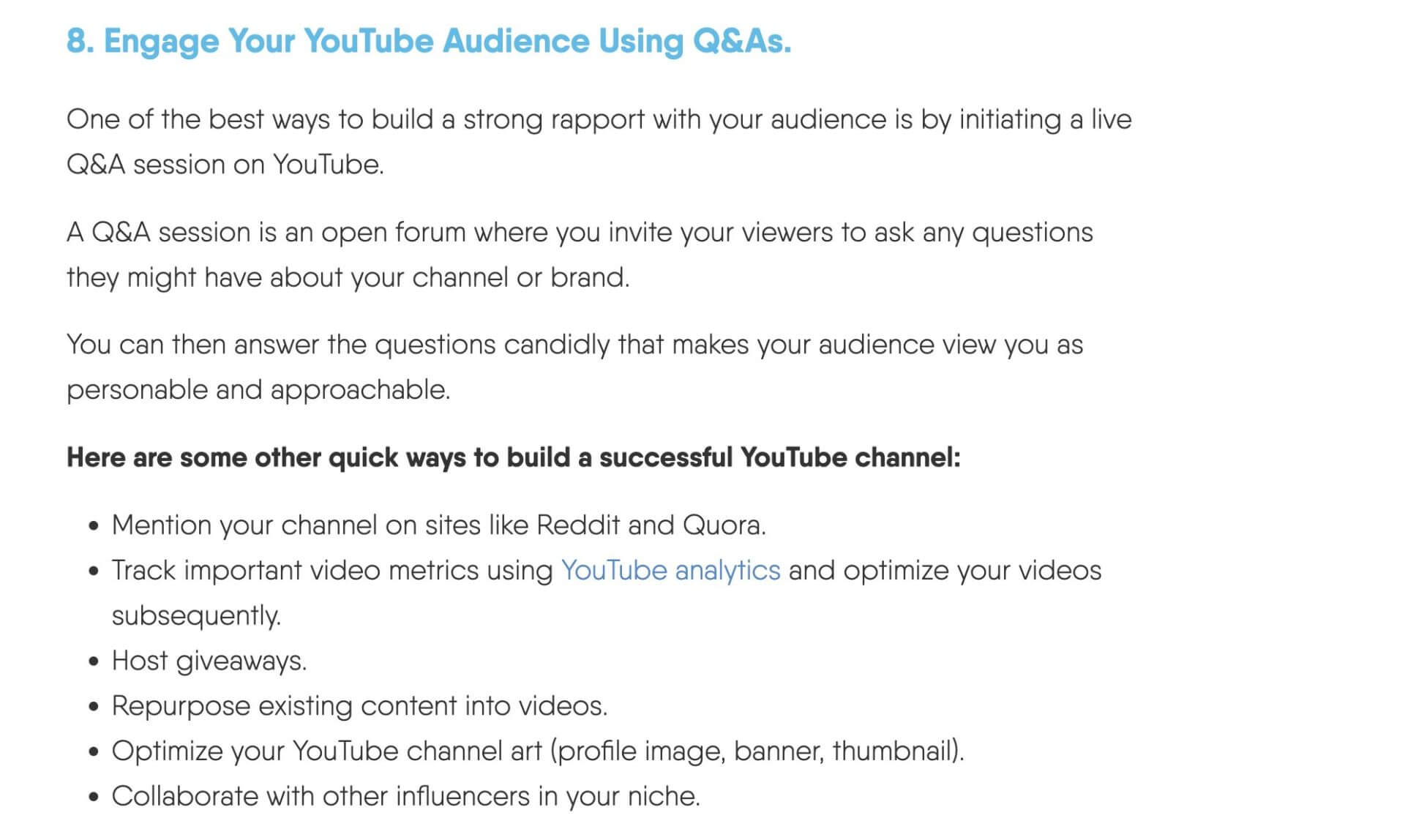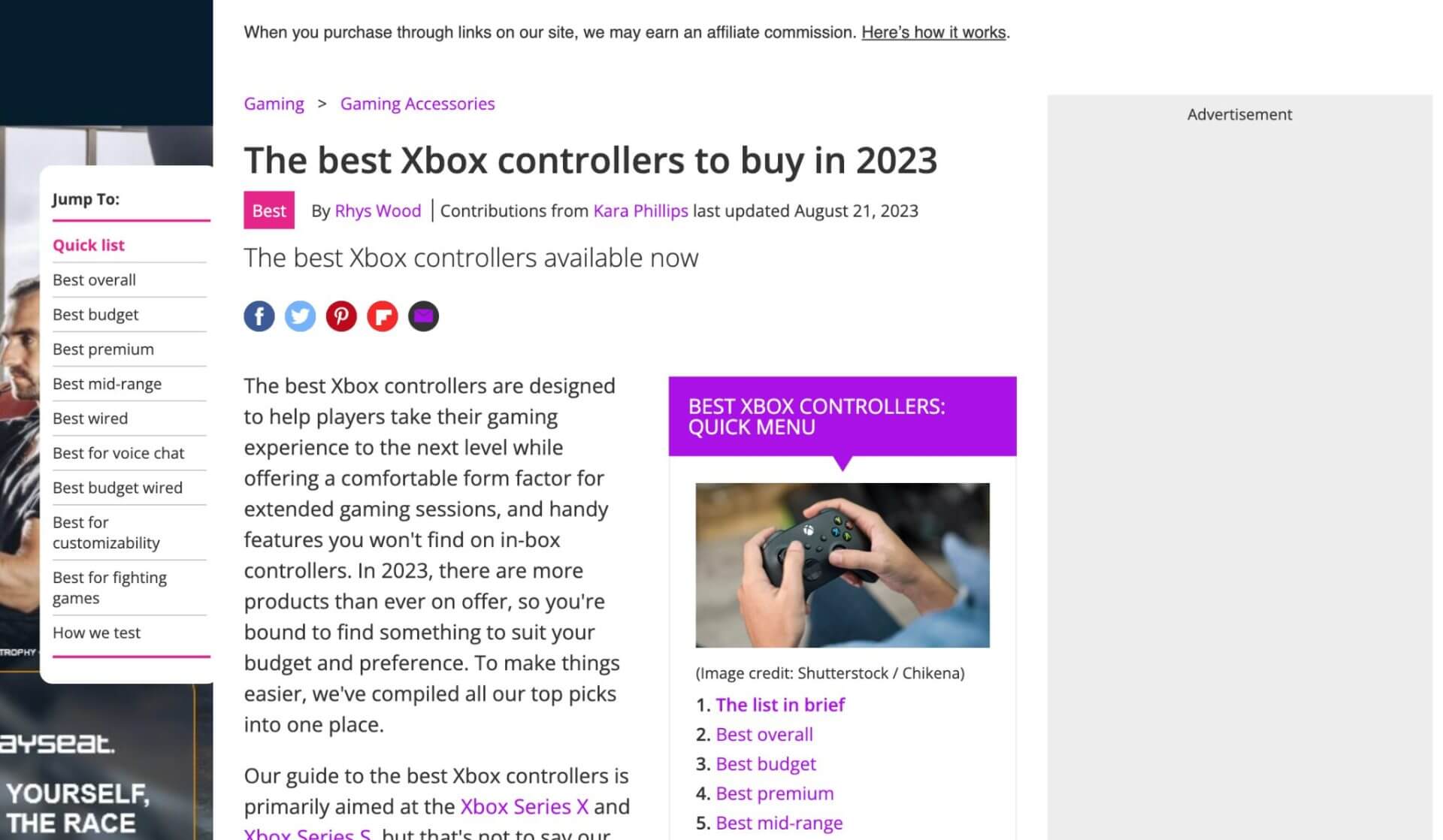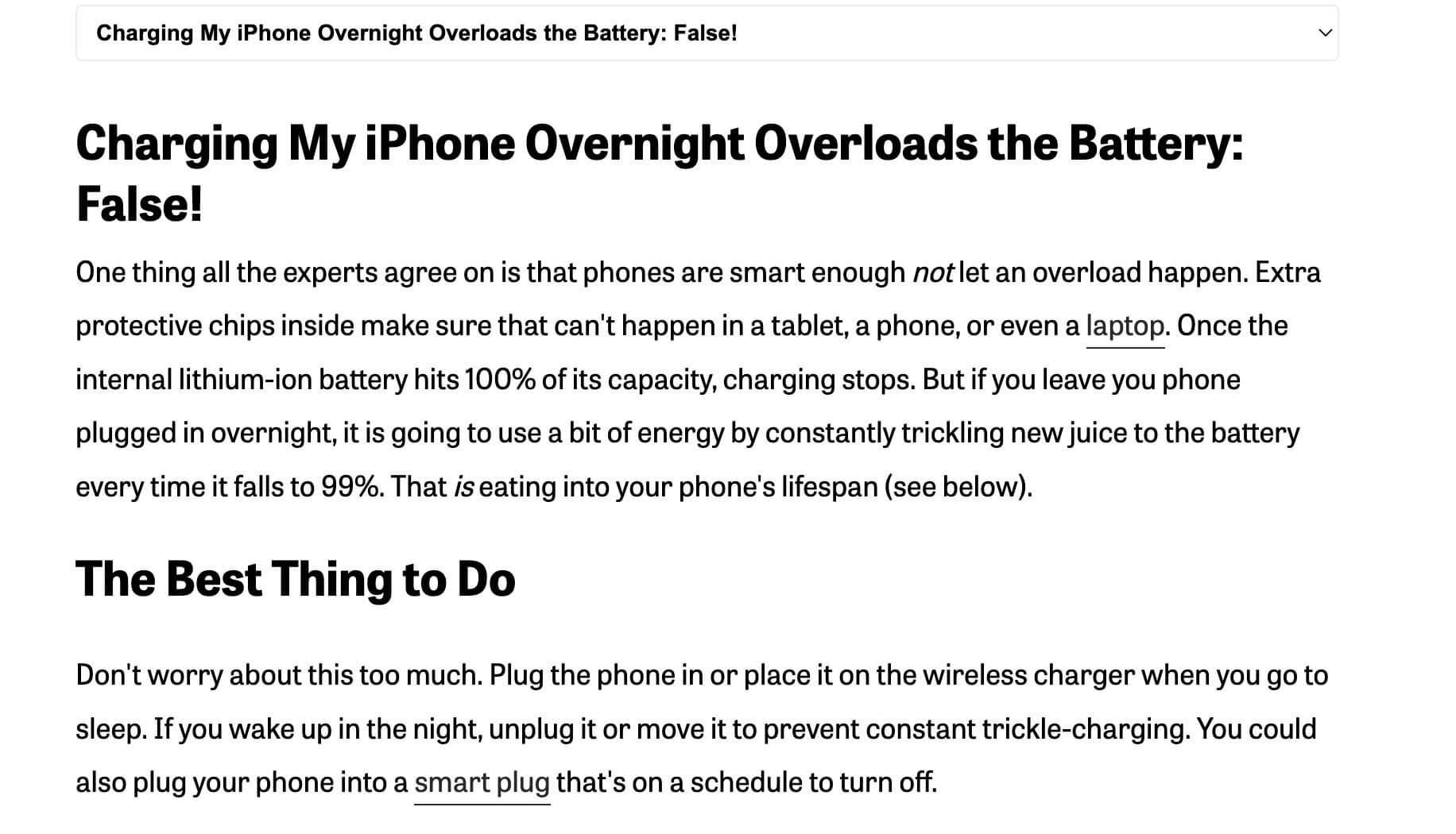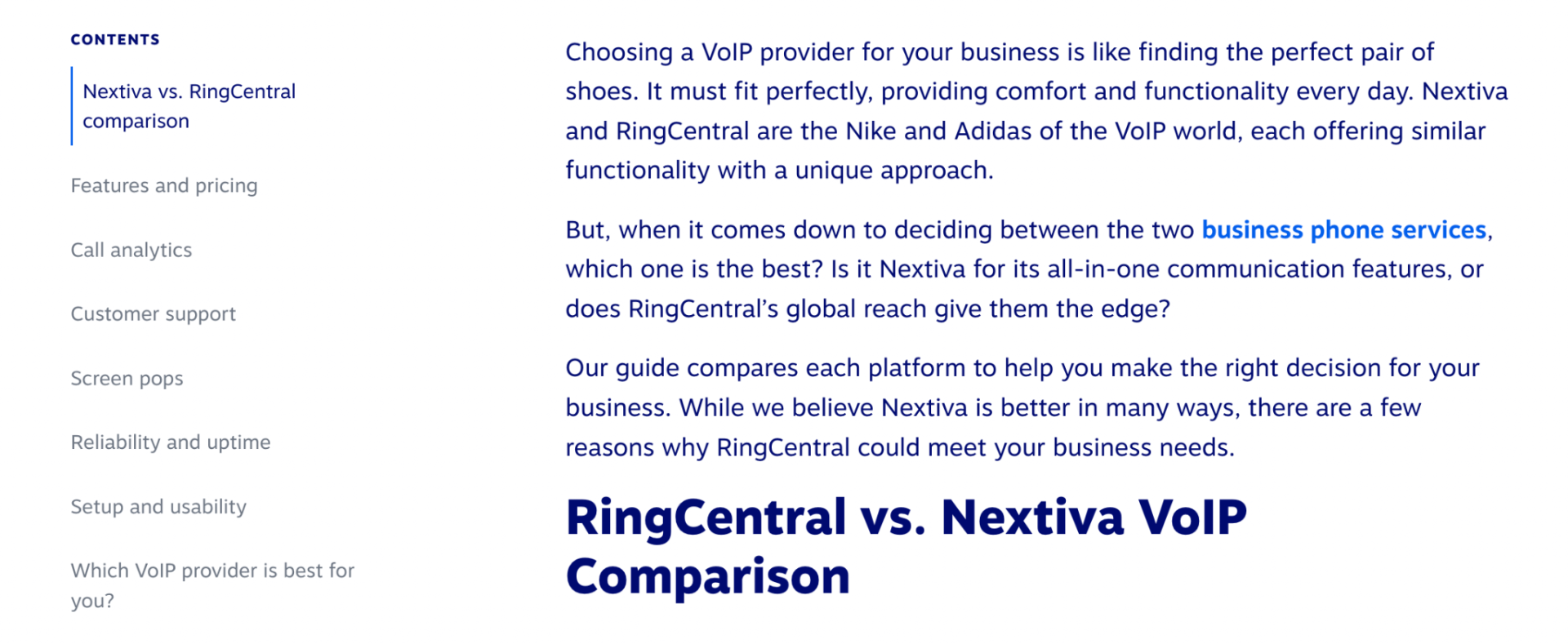50+ Vetted Blog Ideas & Formulas to Write Your Next Article

If there’s one thing that people in all blog niches struggle with, it’s finding new blog ideas.
Creativity can dwindle when you write for a living. And no matter how much research you do, sometimes it can feel impossible to find blog ideas that your readers engage with.
This guide on content ideas is here to help. Whether you’re a newbie in the blogging world or a seasoned veteran, this list of blog ideas can help you generate creative content and keep your blog posts fresh.
13 new blog post ideas
- How-to guides and tutorials
- Listicles
- Ultimate guides
- Question and answer posts
- Round-up posts
- Debunking myths
- Interviews
- First-hand experience or case studies
- Product reviews
- Comparison posts
- Alternative posts
- Opinion-led or contrarian posts
- Research or statistics posts
Read more: How to Start a Blog & Make Money Online ($200k Per Month)
- 1. How-to guides and tutorials
- 2. Listicles
- 3. Ultimate guides
- 4. Question and answer posts
- 5. Round-up posts
- 6. Debunking myths
- 7. Interviews
- 8. First-hand experience or case studies
- 9. Product reviews
- 10. Comparison posts
- 11. Alternative posts
- 12. Opinion-led or contrarian posts
- 13. Research or statistics posts
1. How-to guides and tutorials
How-to guides are informative posts that are primarily instructional. They are step-by-step guides that help readers understand a particular concept or provide instructions for specific tasks.
If you already have practical knowledge of the subject, creating tutorial content is easy. You just need to demonstrate the process from your experience and use affiliate links to promote the products you use throughout.
- “As we have a B2B blog, our tutorials are particularly important as they are a chance to demonstrate that we’re experts in our field and drive more conversions than other blog formats we’ve experimented with.” —Martin Woods, SEO consultant at MeasureMinds
Headline formulas to use for this blog idea include:
- How to Do X in Y Easy Steps
- How to X from Scratch
- X Steps to do Y
- How to X: The Beginner’s Guide
- How to X in Just X Seconds/Minutes
- A Cheatsheet on How to X
This great blog post from CoSchedule, for example, includes screenshots, images, or videos to illustrate each step. It clearly explains each part of the tutorial so readers fully understand how to create their own content calendar.
The best part: there’s a promise of something free in the blog post. Adding the word “template” to the end of its blog post title gives people an extra incentive to click through.

Need more inspiration? More great examples of this blog idea include:
- How to Make a Playlist on YouTube: The Step-By-Step Guide to Increase Engagement
- How to Make an Infographic in 5 Easy Steps — Fast (2023 Guide)
- How to Make DIY Balloon Garland (Easy Tutorial)
2. Listicles
A list post, also known as a listicle, is a type of blog post that features several things. (Like the one you’re reading right now!)
You can use numbered lists to attract multi-tasking audiences too busy to read the entire content. Listicles make it easier for the readers to skim through the title and get the general idea through the titles only.
- “In the travel industry, I find listicles tend to be most useful. I always try to structure posts in the most logical way for the reader. This is because Google wants us to write for humans, not for their algorithm—so it wouldn’t be wise to put information up higher to attract SERP results if it means making the article confusing to readers.” —Lynne Lessard, blogger at Travelynne
Here are some headline formulas to use this blog idea for your own site:
- X Ways to Do Y
- X Reasons Why You Should Y
- X Things I Wish I Knew Before
- X of the Best Y
- X Reasons to Avoid Y
- X Life-Changing Things You Should Know About Y
Here’s an example of a listicle titled “157 Best Affiliate Programs”.
Since the list is too long, it has several sub-sections so readers can quickly reach the blog topics they’re interested in:

Other great examples of listicles include:
- Advice for New Freelancers: 29 Things I Wish I Knew When I Started Freelancing
- 21 Life-Changing Trips Everyone Should Experience at Least Once
- Hiring a Digital Marketing Expert: 9 Mistakes to Avoid
3. Ultimate guides
An ultimate guide is exactly what it says on the tin: a blog post that compiles everything someone would want to know about a topic.
This blog idea is typically a lengthy one. Depending on what you’re blogging about, it’s not unusual for ultimate guides to span thousands of words.
Here are some headline formulas to get you started with this blog idea:
- The Ultimate Guide to X in 2024
- A Winner’s Guide to X
- An Uncensored Guide on How to X
- How to X: The Ultimate Guide for Y
- The Only Guide You’ll Need on X
- “[Ultimate guides] provide depth, offering readers a comprehensive view of a subject. And given the technical nature of some of my topics, depth often matters.” —Michael L. Moore, blogger at Devoted to Vinyl
Do extensive research to figure out what people would want to know about the topic you’re blogging about.

Other notable examples of the ultimate guide include:
- Social Media Marketing: The Ultimate Guide
- Ultimate Guide for Getting More Views on Instagram
- Candle Making – A Guide For Beginners
4. Question and answer posts
Did you know that 8% of all Google searches are formatted as a question?
Use this to your advantage by relying on keyword research tools like Ahrefs or Moz to find frequently-asked questions (FAQs) your target audience is searching for. Package the answer on your blog and optimize it for people searching for that question.
Rover, for example, answers the question “Why is my cat biting me?” in this blog post. It targets two questions simultaneously—firstly sharing why cats bite, followed by ways you can stop it.

Here are some more examples of this blog idea in practice:
- Is the Physics of Time Actually Changing?
- When Do You Become a Developer?
- How Much Does Spotify Pay Per Stream in 2023?
5. Round-up posts
A round-up post is a collection of things—be that products, influencers, or the latest trends readers in your industry are passionate about.
Often overlapping the listicle format, a round-up post is a great way to monetize your blog. Choose a selection of products that you have affiliate links for. When someone purchases through the link in your blog post, you’ll earn commission.
Get started with this blog idea using the following headline formulas:
- X of the Best Y
- X Blog Posts About Y You Must Read
- X of the Top Y for Z
- X Most Popular Y
- X Expert Tips for Y
Take this blog post from PC Mag, for example. It breaks down the best Xbox controllers, broken down by budget, type, and use case.
There’s also a disclaimer at the top of the blog post that says “When you purchase through links on our site, we may earn an affiliate commission.”

For more inspiration, take a look at how these bloggers have used this idea:
- The Best Amazon Seller Forums
- The 12 Best Weight Benches for Your Home Gym in 2023
- We’ve Got Your Back(Pack): The 13 Best Backpacks For Women
6. Debunking myths
Every industry has a set of myths—things people believe to be true, but are actually incorrect.
Position your blog as an expert in its niche by debunking these myths. Not only does it show you as an authority on the subject, but headlines that argue somebody’s belief often get more clicks.
Here’s how to use this idea for your own blog content:
- Why You Should X: Y Myths Debunked
- X Common Myths About Y
- X Myths You Shouldn’t Believe About Y
PC Mag has a great example of how you can debunk myths to create great content.
Its guide to charging your phone overnight challenges five common beliefs on the topic—including whether charging your phone overnight will damage the device’s battery.

For further reading, here are three more articles that use these blogging topics:
- 5 Myths About Medical AI, Debunked
- Charging Your Phone Overnight: Battery Myths Debunked
- 6 Myths About Climate Change Busted
7. Interviews
Instead of making yourself the voice of your blog, interview subject matter experts and publish the conversation on your blog.
The benefit of the interview blog idea is that your audience gets a selection of opinions without leaving your blog. When you reach out to experts on influencers, your blog can become a reader’s go-to source for unbiased inspiration and advice on that topic.
Here’s how to get started with this blog idea:
- An Honest Interview with X
- What I Learned by Interviewing X
- What X Says About Y
- Why X Thinks You Should Y
- I Talked to X About Y—Here’s What You Should Know
Faber uses this blog format to create new content for its website.
In this article, the blogger interviews Nadeem Aslam—an editor-turned-author who has incredible insights on how to write from personal experience and create stories readers love.

Some more great examples of the interview blogging idea are:
- Bieber on Bieber: Justin Interviews Hailey for the Very First Time
- I Asked the World’s Top 100 Digital Marketers for Advice. Here’s How They Responded
- I Talked to 1,000 of the World’s Top CEOs—Here’s the No. 1 Question They Want You to Ask at a Job Interview
8. First-hand experience or case studies
People often look to others for advice when they’re about to do something for the first time.
First-hand experience is a competitive advantage when you’re blogging—even if you’re not posting on a lifestyle blog. You can reach a lot of people looking for advice by sharing your story on your blog.
- “I have a soft spot for stories. Narratives. Whether it’s a tutorial or a listicle, I believe weaving a personal or fictional story around it makes the content more relatable. Think of it as attending a lecture. Would you prefer bullet points or a professor who talks about the time they messed up an experiment, what they learned, and how they made it right?” —Maria Opre, lead writer at EarthWeb
Remember that you don’t have to write these yourself. Consider opening your site up to guest posts and have readers share their own experiences on your blog.
Simple techniques to use this blogging idea include:
- What I Learned After X
- X Life Lessons I Learned After X
- Why I Learned to X After Y:
- X Key Takeaways I Learned From Y
- How I X in X Days
- Why I Don’t X
- X Success Stories of Y Who Did Z
James Clear, for example, used this blog idea for his article titled “What I’ve Learned from 2 Years of Intermittent Fasting”.
Readers considering whether they should do intermittent fasting can learn from someone who’s already done it, helping to position James as an expert they should listen to.

For more inspiration on how to use this blog idea, look at these articles:
- 10 Life Lessons I Learned After Lockdown
- We Tried the Viral No-Heat Curls Hack That’s All Over TikTok
- 5 Years Later: What I Really Learned from Study Abroad
9. Product reviews
Most bloggers start a new blog to make money online. That’s easier to do with product reviews.
Product reviews are a blogging idea that allows you to reach people who are already looking to buy something. If you can be the final touchpoint between researching a product and buying it, you can earn affiliate commissions by joining the brand’s affiliate program.
Build a profitable blog by publishing this type of content using the following headlines:
- Is X Worth It?
- An Honest Review of X
- Should You Buy X? Here’s an Honest Review
In Chile Reptile’s blog post that reviews Blog Growth Engine, blogger Sam Rexford details the pros, cons, and pricing options of the blogging course.
Anyone interested in taking the course can get a third-party opinion on whether it’s worth it.

Here are some other great examples of how creators are using this blog idea:
10. Comparison posts
Comparison posts are blog posts that review two or more products to help readers decide which product is most suitable for them.
Naturally, these posts demand more in-depth research and analysis for the products you’re reviewing. Comparison posts are also a great way to earn revenue through affiliate marketing since you can monetize each product link in your article.
Here are some headlines to use this blog idea:
- X of the Best Y, Compared
- We Compared X of the Best X So You Don’t Have To
- X vs. Y: Which is Best for Z?
Nextiva uses this blog idea to compare themselves against RingCentral. People see the different features, usability ratings, and pricing options for each provider.

Other superb examples to browse for inspiration include:
- 6 Smart AI Math Solvers to Find Answers Fast (Compared)
- Content Marketing vs. Copywriting: What Are the Major Differences?
- Ibiza vs. Mallorca: Which Should You Visit?
11. Alternative posts
Alternatives posts are like list posts, where you list out alternatives of a specific product. Like list posts, these reviews gain more traction if you add more alternatives than your competitors.
People usually search for alternative posts when they wish to switch to a different product with similar functions. Moreover, readers are already familiar with that particular type of product. Now your job is to provide alternatives with upgraded features or cheaper pricing plans.
Capitalize on this blog idea by writing alternative posts using these titles:
- X Alternatives to Y
- The Best X Alternatives for Y
- X Great Products That are Similar to Y
- X Alternatives: Ranked and Reviewed
Tom’s Guide, for example, uses this format for his blog post on Apple Pencil alternatives.
The keyword “best Apple Pencil alternatives” is mentioned many times throughout the post. There’s also a breakdown of each alternative product, including its specifications, pros, cons, and affiliate links to buy.

Get more inspiration on how to use this blog idea by scanning these articles:
- Stitcher Alternatives: Best Podcast Listening Apps to Use Now
- 18 Olaplex Alternatives Stylist’s Beauty Team and Leading Hairdressers Recommend
12. Opinion-led or contrarian posts
A contrarian perspective usually entails having a standout or controversial viewpoint.
Such posts have a high chance of going viral since they are a fresh alternative to regular posts. People usually click on these posts out of curiosity, helping you gain more comments, social shares, and backlinks.
Plus, controversial opinions create a ripple effect. Viewers may or may not agree with the topic but will still click on the heading.
Put this into practice on your own blog using this topic idea:
- Why I Don’t Believe In X
- X Things You’ve Got Wrong About Y
- X Contrarian Opinions I Have About Y
Nathan Barry is one creator using this blog idea to create new content for his blog.
This guide, titled “When should you trade time for money?”, opens with a popular statement that he disagrees with.

Explore more contrarian opinions by browsing these articles:
- Is Email Marketing Dead? No, But These Practices Are
- 12 Reasons to NOT Diet
- Why Henry Ford’s Most Famous Quote Is Dead Wrong
13. Research or statistics posts
Statistic-led posts take a lot more time to create since you’ll need to find credible sources for each data point on your list.
That said, they’re one of the best ways to build backlinks to your blog. Other writers often link to statistics round-ups when they’re looking to add credibility to their own content.
Backlinks are the fuel of any blog growth strategy. Not only can they drive traffic to your blog, but they show search engines that your website is worthy of ranking high in its search results. This can drive traffic to more heavily monetized articles.
Put this into practice with headlines like:
- X Statistics You Should Know About X
- X Top Y Statistics for 2024
- The Ultimate List of X Statistics
More popular posts that use this blog idea include:
- 74 Amazon Statistics You Must Know: 2023 Market Share Analysis & Data
- Pet Ownership Statistics in 2023—70 Fun Fur Facts
- 40+ Business Blogging Statistics to Power Your Content Strategy
Use these blog ideas to create your next article
These blogging ideas are a great starting point when brainstorming new content. Go through the list and think about your readers. What would they most want to know? How can you package your advice to create the best blog post on that topic?
Remember to explore different monetization strategies to take your blog revenue to the next level.
From adding affiliate links in product reviews to placing ads on statistics round-ups, working backwards can help you create a world-class blog that makes money.





